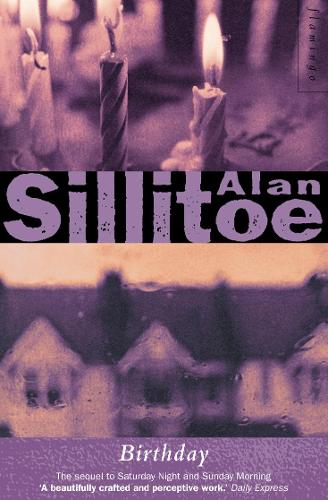
Birthday
(Paperback)
Publishing Details
Birthday
By (Author) Alan Sillitoe
HarperCollins Publishers
Flamingo
27th March 2002
United Kingdom
Classifications
General
Fiction
823.914
Physical Properties
Paperback
256
Width 129mm, Height 198mm, Spine 14mm
209g
Description
The sequel to Saturday Night and Sunday Morning.
Birthday is the sequel to Alan Sillitoes classic novel of the 1950s, Saturday Night and Sunday Morning.
Four decades on from the novel which was at the forefront of the new wave of British literature, we rediscover the Seaton brothers: older, certainly; wiser possibly not.
Arthur and Brian Seaton, one with an ailing wife, one with an emotional knapsack of failure and success, are on their way to Jennys seventieth birthday party. Jenny and Brian had years ago experimented with sex semi-clothed, stealthy, with the bonus of fear. Arthur, of course, had cut a winning swathe through the married and unmarried women of Nottinghamshire.
Life has changed. But there is still pleasure; and still pain.
Alan Sillitoe is undoubtedly one of the greatest English writers of our time, and, indeed, one of the most influential.
Reviews
'Sillitoe remains the most physical of writers, spontaneous of language yet resolutely protective of its values. Sharing common territory with the late novels of Kingsley Amis, Birthday represents a carefully textured work by an old devil, still spiky after all these years.' Independent 'A beautifully crafted and perceptive work.' Daily Express 'Many people will certainly be in tune with the Seatons' stoically nostalgic outlook, and the occasional flash of recognition that the present may not be as bleak as it is painted, and the past not as golden. Sillitoe does not make the process of growing old look particularly enjoyable, but he logs the details - the day to day difficulties; the growing isolation; the dying friends and family, slowly but surely removed from an ever-decreasing social circle - with a devastatingly accurate eye. Sillitoe's insight is acute.' Scotland on Sunday 'There are parallels here with Kingsley Amis's The Old Devils - another old man's book about old age. But it is well worth reading, both for its evocation of a vanished way of working-class life, and for its steadfast depiction of the horrors of old age and the valour and comradeship that can, in part at least, redeem it.' Daily Telegraph
Author Bio
Alan Sillitoe was born in 1928 and left school at fourteen to work in various factories before becoming an air traffic control assistant with the Ministry of Aircraft Production in 1945. He began writing after four years in the RAF. He is one of the undisputed finest novelists of his day.
